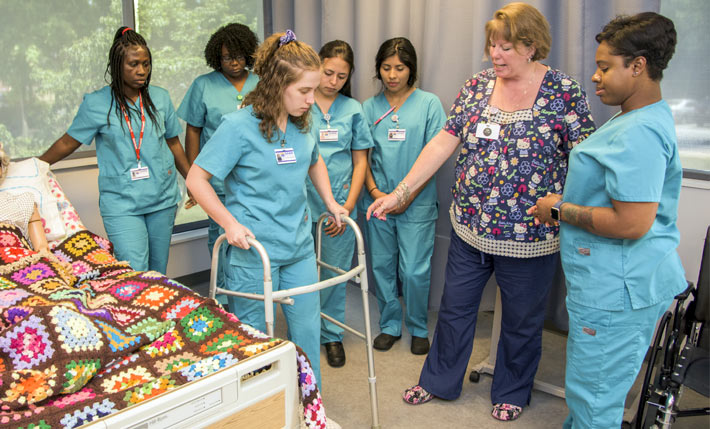Four tips to help you stand out
Nursing assistants are vital resources for medical teams and patients. People in this occupation, which is projected to see employment growth of 9% by 2028, also wear many hats in their roles. From patient care to administrative duties, nursing assistants often serve as a connection between patients, families and doctors, so having a variety of skills is essential.
Besides knowledge of the field, to be a successful nursing assistant you will need to master time management and develop other soft skills such as communication, listening and collaboration.
Dawn Career Institute provides the necessary hands-on training to help you attain a well-rounded skillset to support your success as a nursing assistant and member of a medical team.
Check out these tips to help you stand out as you pursue career training as a nursing assistant.
Communicate, Communicate, Communicate
Communication may sound like a simple tip, but it is one of the most important skills to becoming a valuable teammate. In any field, communication is essential, but as a nursing assistant successfully communicating with a variety of audiences is a necessity. Your daily activities will require interaction with patients, doctors, other nurses, families and administrative staff. This means that your communication skills play an important role in delivering quality care.
While information can change quickly and some days are busier than others, you will want to make sure your team is up to speed on all pertinent information. In your role, you’ll want to share any observations about your patients with your teammates to ensure your entire team is working together to deliver the best care. This includes clearly communicating information such as:
- Vital signs
- Food and liquid intake
- Medical history
- Additional concerns
Show Compassion and Empathy
While your interactions with patients will vary depending on the type of medical facility you are working in, you may work with patients who have a lot of questions. Remember that patients often have fears about their health and may feel anxious about being in an unfamiliar medical facility.
Showing compassion and having empathy means providing care to your patient without judgment, offering reassurance and voicing their concerns to their doctor. As a nursing assistant, your sympathetic support and compassion will help ease their minds. Treat your patients the way you would want to be treated if you were in their position.
Be Prepared
While some tasks may carry over from day to day, you should always be ready for the unknown and be able to adapt. Collaborating with your team to create a routine will help everyone get tasks done in a timely fashion and provide the best care for your patients. Additionally, it can help improve your communications with co-workers by ensuring you create consistent forms of communication as part of your day.
Each procedure, whether that be taking a patient’s vitals, weight or medical history, should be performed according to your training to ensure accuracy.
Attention to Detail
As a medical professional, it is important for you to pay attention to every detail while interacting with a patient.
From seeing multiple patients to reporting back to nurses and doctors, your day will be full of details and tasks. Find what processes are best for you to stay organized while prioritizing your tasks and using your time efficiently. This will help increase co-workers trust in you while ensuring that you are providing your patients with the proper attention and high level of care.
Considering a career as a nursing assistant? We’re here to answer your questions.
At Dawn Career Institute, we are ready to help you start the path to your new career as a nursing assistant. Visit us today to learn more about our nursing assistant program and to schedule a tour.





